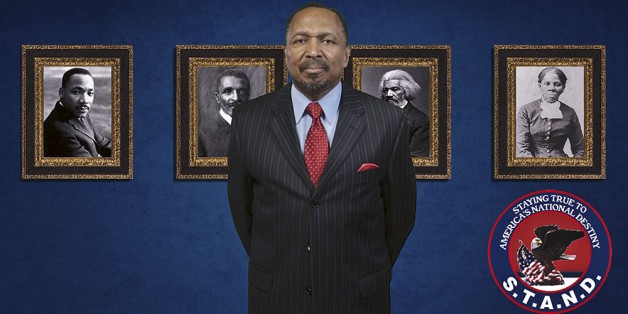Can You Still Win an Election If You’re Against Gay People?
-

E.W. Jackson ~ A candidate for lieutenant governor in Virginia who might have done well a decade ago now faces an increasingly tolerant electorate.
By Alex Roarty
For a moment last week, Ari Fleischer found a subject more worthy of derision than Benghazi or the Internal Revenue Service. President George W. Bush’s former press secretary took aim at a fellow Republican named E.W. Jackson.
A day earlier, Jackson had improbably won the GOP’s lieutenant-governor nomination in Virginia, taking advantage of a party convention controlled by conservative activists who didn’t mind the Chesapeake-area minister’s relative anonymity. (Only a year ago, Jackson won less than 5 percent of the vote in a GOP Senate primary.) They also didn’t seem to know, or care, that Jackson had a long history of antigay rhetoric, the most incendiary of which includes saying that gay men and women are “very sick people psychologically, mentally, and emotionally,” calling them “perverted,” and comparing homosexuality to pedophilia.
That’s what drew Fleischer’s ire. “Jackson’s antigay slurs are indefensible,” he tweeted.
That a prominent Republican—one whose president only nine years earlier had successfully used gay rights as a wedge issue during his reelection campaign—would offer such a blunt, caveat-free condemnation is a testament to how gay politics has changed in a decade. And Fleischer’s comment is indicative of the fact that Jackson’s week-old campaign is already under siege, so much so that some operatives are speculating he might yet drop out of the race.
All of which suggests that gay politics is nearing a critical threshold: Candidates with a known bias against homosexuals might now face close to the same impenetrable barrier to office as politicians biased against blacks, Jews, or women. Candidates known to be racist, anti-Semitic, or misogynistic are all effectively barred from winning elections in the 21st century—and homophobes might be joining that list. “Even those people who are, based on their faith, against homosexuality, they do not want someone who is going to legislate based on hate toward any group,” said Mo Elleithee, a Democratic consultant and a veteran of Virginia politics. “It is disqualifying. Nothing else he says is ever going to be heard.”
The campaign for lieutenant governor is a good test case in a purple state, but it’s not perfect. Jackson, who is black, also compared Planned Parenthood to the Ku Klux Klan and suggested that President Obama holds a Muslim worldview—meaning that he’ll not only be labeled antigay, he’ll also be labeled as an extremist. Some Republicans continue to believe that although he faces a daunting challenge, Jackson could still win. And Republicans and Democrats agree that even if Jackson, whose invective personally maligns the gay community, loses in November, opposition to gay marriage will still remain politically viable.
But few doubt that antigay slurs carry far more consequence than they did just several elections ago. A Gallup Poll released last week found that 59 percent of Americans consider gay relations morally acceptable—a 19-point shift toward that viewpoint from a survey in 2001. Of the 20 moral issues Gallup polled over the 12-year span, no other issue had such a large swing in its favor. “If he had said this six or eight years ago, I don’t know if we’d be having this conversation, quite frankly,” said one Republican strategist in Virginia, who requested anonymity to speak candidly. “I do think it’s moved forward to a point where this has potential to be a real disqualifier as a candidate.”
To some analysts, the shift is about more than how the public views gay men and lesbians. There’s a larger ongoing evolution, they say, in which voters are far less tolerant of intolerance, period. The victim of the intolerance, whether it be a religious, sexual, or ethnic minority, is almost unimportant. “When you espouse that kind of hatred to any human being, regardless of what they are, or who they are, you are going to have a difficult time putting together the necessary coalitions to get 51 percent of the vote in the 21st century,” said another Virginia GOP strategist. The source added, “White women are not going to go for that. There is a large group of white men who won’t go for that. There are a lot of Republicans who don’t go for that. This is a question about humanity.”
The stern shift against antigay rhetoric would seem to put many religious politicians in a bind. Jackson’s views stem from his faith; the graduate of Harvard Divinity School founded his own church, Exodus Faith Ministries. And many Republicans continue to say their faith dictates that homosexuality is a sin.
But that doesn’t mean, they quickly add, that the kind of rhetoric Jackson has used is acceptable. Republicans need to stick to their principles, they say, while not personally denigrating any group of people. “If you’re a candidate, you want to treat all people with respect,” said Bob Vander Plaats, a prominent social conservative in Iowa who has drawn flak for his own comments that critics consider antigay. “You want to communicate what you’re for, not so much what you’re against.”
In an off-year election that could hinge on base turnout, Republicans point out that Jackson might prevail. If he does, antigay politics may not yet be a disqualifier. But if he loses, don’t be surprised if conservative activists do a little more homework before picking their candidates in the future.
This article appears in the May 25, 2013, edition of National Journal as The Risks of Bias.
Get the latest news and analysis delivered to your inbox. Sign up for National Journal's morning alert, Wake-Up Call, and afternoon newsletter, The Edge.